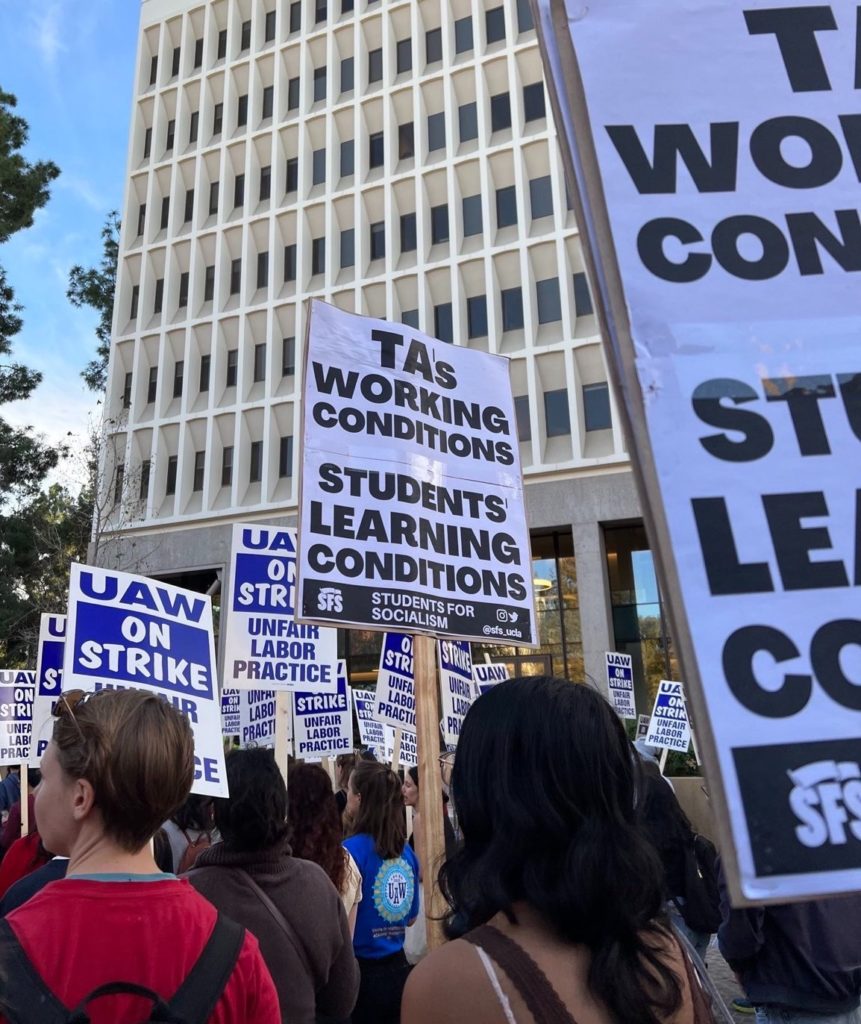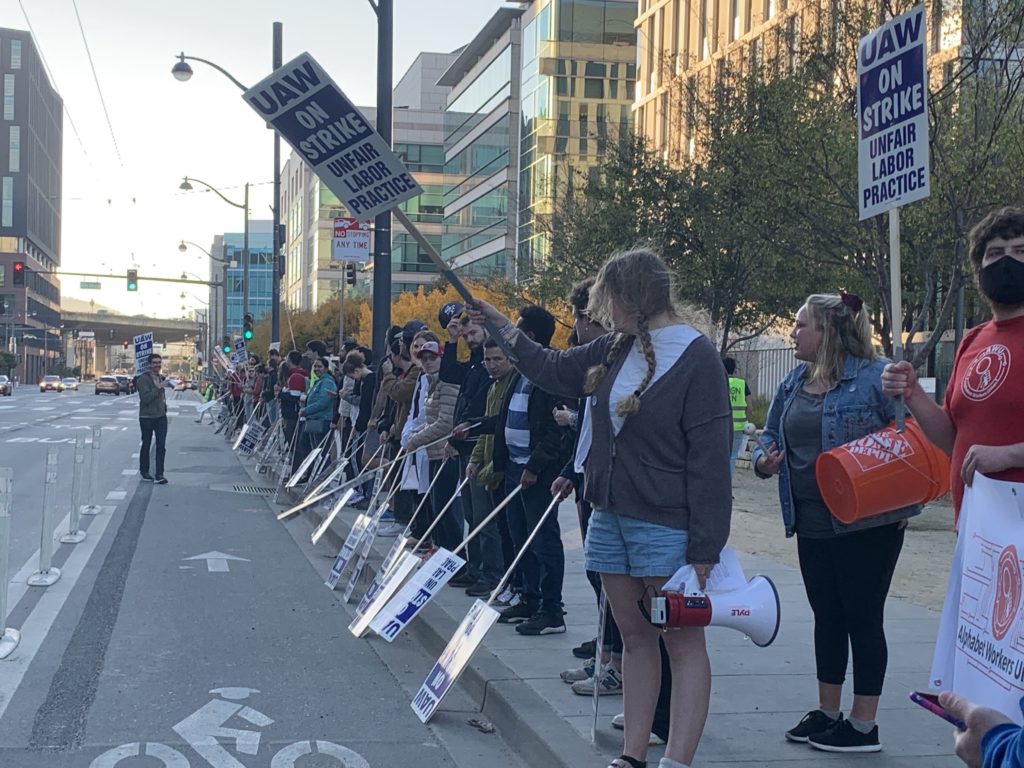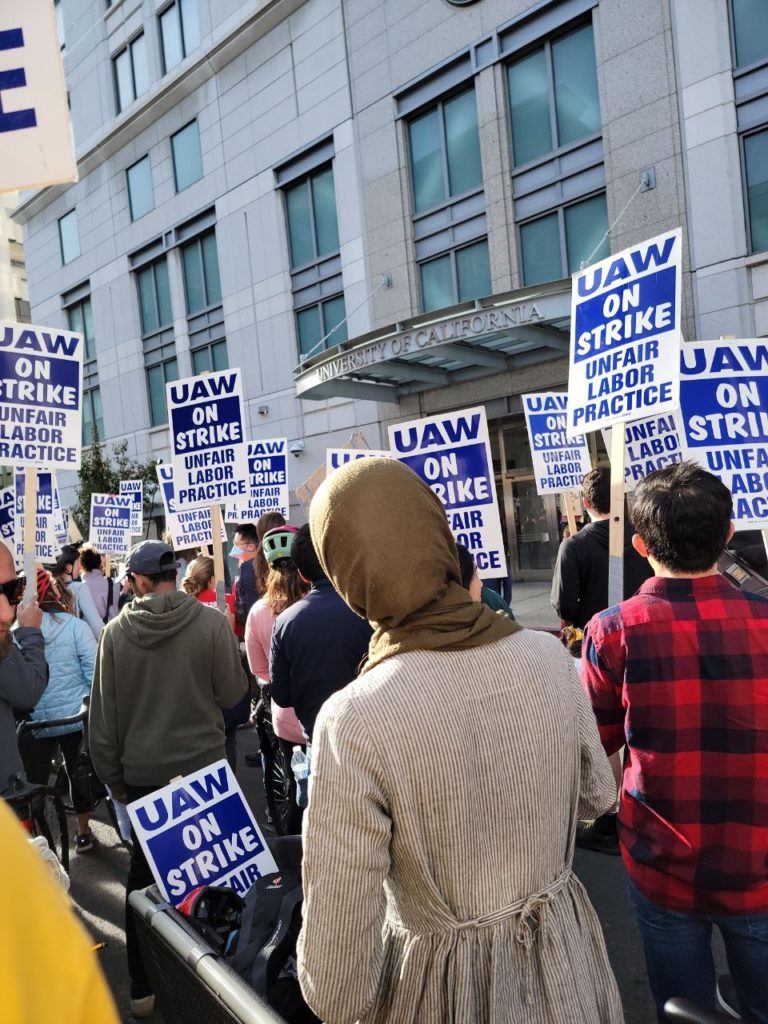After 40 days on strike, 36,000 graduate and undergraduate student-workers across the University of California voted to ratify a historic contract on Dec. 23. The new contract guarantees wage increases of 55% to 80% for Academic Student Employees (Teaching Assistants, Tutors and Readers) and 25% to 80% for Graduate Student Researchers through 2023 and 2024, as well as many other significant wins.
Other important wins for student-workers include a 27% increase in child care subsidies, the expansion of fully paid parental and family leave to eight weeks, expanded coverage of dependent health care, guaranteed transit benefits, precedent-setting protections against bullying and harassment, guarantees of safe working conditions and new rights for workers with disabilities. In addition, after years of fighting, the workers won a three-year waiver of all campus fees — which can reach thousands of dollars each year — and a waiver of non-residential supplemental tuition for doctoral candidates, a key issue for international students who often do not qualify for the tuition waiver negotiated in previous contracts. These contracts will expire in only 2.5 years, setting the stage for another round of bargaining starting in January 2025.
None of these historic wins would have been possible without the power of a union. The struggle against the multibillion-dollar University of California system was led by UAW 2865 (Teaching Assistants, Tutors, and Readers), UAW 5810 (Postdoctoral workers and Academic Researchers), and the newly recognized SRU-UAW (Graduate Student Researchers). The three union locals represent 48,000 workers across the state of California who carry out the majority of teaching and research at UC.
Earlier in December, Postdoctoral workers and Academic Researchers represented by UAW 5810 — who are the first group of Postdocs and Academic Researchers to go on strike — won impressive contract gains that included major salary increases, in addition to increased paid family leave, a new child care subsidy, additional protections for recent immigrants, language to prevent bullying and abuse by supervisors, disability justice provisions, stronger union security and grievance articles and public transit passes.
The four bargaining units spent years strategizing and organizing to line up the contracts and coordinate efforts to make the strike a reality, which was the largest in many years and the largest-ever in higher education. And the scope of wins bear this out: The union won dramatically larger wage increases and non-economic gains that UC had fiercely fought for decades. Seventeen thousand Student Researchers won their first contract after struggling to attain collective bargaining rights since the 1980s, a basic right that the university bitterly opposed until the union successfully changed state law in 2017.
In addition to impressive economic wins, the contracts set a precedent for academic workers across the country. Any institution of higher education, whether public or private, will no longer be able to give academic workers the bare minimum. The strike victory is a critical one that comes amidst a wave of organizing in higher education. Academic workers across the country — including those at USC, Johns Hopkins, Northeastern, Boston University, and many more — have been inspired by what was accomplished by UC workers and have begun a wave of their own labor organizing.
With classes canceled and research labs empty, the workers engaged in a wide array of tactics to disrupt business as usual across the massive 10-campus university system that stretches across California. Tactics included mass picket lines, rallies and direct action protests targeting key decision-makers. The workers’ struggle was also bolstered by solidarity from other unions which refused to cross the picket lines. For weeks on end, UAW members woke up at 2 or 3 a.m. to picket early morning deliveries and construction sites at UC campuses, talking to workers from other unions and asking them to respect the picket line. With Teamsters, Building Trades, and other unions holding the line, empty construction sites and lack of key deliveries created additional economic leverage on university administrators.

After the early morning disruptions these members would spend the rest of their afternoon leading large pickets and marches, talking to their coworkers en masse and in one-on-one conversations. In the evening, once picketing was over for the day, the planning for the next day and weeks ahead began. This was an average day of striking for the most dedicated, a routine which was consistent for over a month.
Workers had to constantly respond to employer counter-offensives to subvert the picket. At every turn, the UC positioned police officers, lawyers, hired security and labor relations personnel at pickets to record and document every move that the workers made. Picketers were followed from one location to the next, and hired security would surveil workers outside of delivery locations. Labor relations personnel threatened arrest and claimed workers were breaking the law by exercising their right to picket and talk with unionized workers from other locals, but these were baseless charges and went nowhere.

The workers held strong over the Thanksgiving holiday break with mobilizations at UC campuses across the state. As a result of the constant pressure, UC negotiators were forced to concede and made substantial offers to the 12,000 Postdocs and Academic Researchers represented by UAW 5810, who reached tentative agreements on Nov. 28. Postdocs and ARs stayed on strike for two additional weeks with UAW 2865 and SRU-UAW throughout their ratification votes. On Dec. 9, the UAW 5810 contracts were ratified with 85% of the members voting; over 85% voted “yes” for the new contracts.
The strike continued with UAW 2865 and SRU-UAW escalating the pressure on the UC management with mass occupations, sit-ins and acts of civil disobedience. In mid-December, the union and university bargaining teams agreed to engage in mediation by Sacramento Mayor Darrell Steinberg. In less than a week of mediation, and thanks to the relentless pressure of the workers, UC was forced to make additional concessions on wages, child care subsides, tuition waiver, and dependent health care coverage. On Dec. 16, a tentative agreement was approved by the bargaining teams of both unions and put to the membership to vote on ratification.
Despite the historic wins in the tentative agreement, the effort to ratify the contract still faced internal challenges. Many workers were relieved to have secured such an impressive victory after a hard fought struggle — a month out on strike is no easy feat. Understandably, some felt that while the tentative agreement was a significant improvement from UC’s original proposals, the agreement did not satisfactorily address all of the core issues that led to the strike.
A vocal group of members adopted the position that even more economic wins could have been secured through an indefinite “long-haul” strike past the late December deadline for workers to submit grades. They characterized the union leadership as “sell-outs” for putting this contract up to a vote and organized a “Vote No” campaign on social media and even in the mainstream press. “No” vote campaigners argued that the wage increases of 50% to 80% were either too insignificant or kicked in too late, and characterized partial wins on certain topics as “leaving workers behind.”
The “Vote No” campaign consistently framed the unions’ democratically elected leadership as the main obstacle towards a strong contract. But the strength or weakness of a union does not stem from a handful of leaders, it comes from the entire membership. Rhetoric which replaces this core principle with distrust of fellow coworkers elected to leadership positions sends the message that workers are always doomed to be betrayed. It shifts the focus from the employer to the elected union leadership. Such an orientation makes any contract, however strong, a de facto defeat and promotes demoralization rather than hope, confidence and a deeper commitment for the next fight.
UC academic workers had just waged a historic struggle against the boss and experienced first hand — for many, for the first time — how organization, leadership and collective struggle can result in victories that were once seen as impossible. The “Vote No” mindset ultimately fell flat. The final vote was a solid majority in favor of the tentative agreement, with UAW 2865 voting 62% in favor and SRU-UAW voting 68%, with supermajorities of workers participating in the votes.

Following the incredible victory of collective action, much of the next two years will be dedicated to enforcing the new contract — making sure the UC can not weasel its way out of guaranteeing what it has agreed to. Looking to the next contract struggle, a major task will be to build upon the foundation of these victories to continue strengthening the union so that we can win the demands that could not be won this time around.
The intense struggle at UC for fair contracts concluded with impressive victories that provided impressive lessons for the continued struggle of exploited academic workers. It was a transformative experience for thousands of workers who fought for and secured gains that the university said could not be achieved.
Feature photo: First day of the UAW Academic Workers strike at University of California – Los Angeles on Nov. 14. Liberation photo





